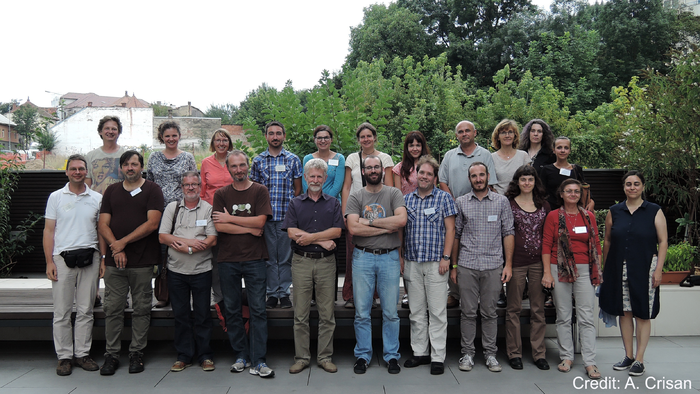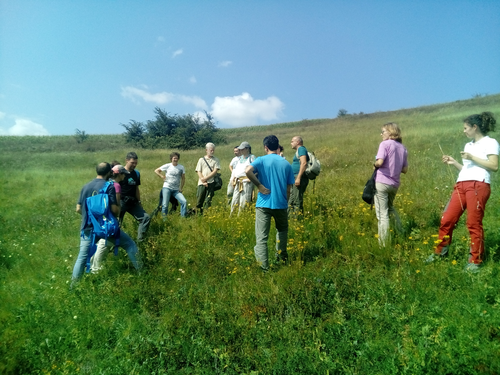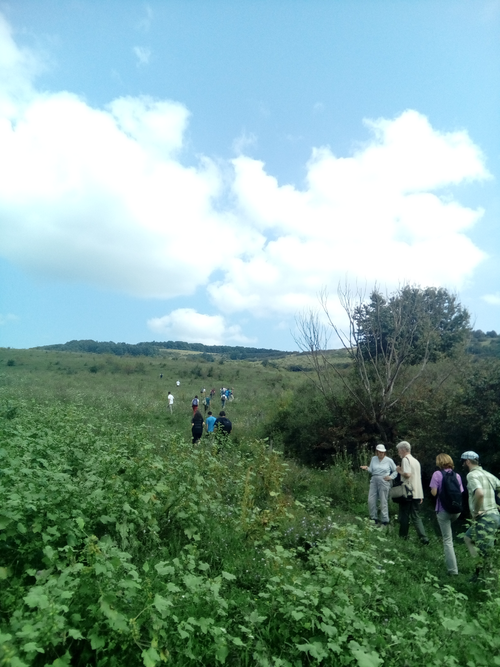International workshop on ecosystem services provided by farmland, hosted by Sapientia University, Cluj-Napoca, Romania

In the period of 22-25th of August, Sapientia University hosted a major workshop organized within the international transdisciplinary project ‘Sustaining agricultural change through ecological engineering and optimal use of ecosystem services’ (acronym: STACCATO), which is coordinated by the Helmholtz Centre for Environmental Research – UFZ, Germany.
The major goal of this project is to advance the long-term sustainable development of land use systems against risks of global change. The research initiative aims at quantifying the sensitivity of ecosystem functions and their subsequent ecosystem services to environmental pressures in representative agriculturally dominated landscapes across Europe. Core project partners comprise people from six European countries: Bulgaria, Romania, Switzerland, Germany, Sweden and Spain. An increasing number of partners became and is expected to become associated to the project. The ecosystem services assessed within STACCATO are: provisioning, regulating and cultural ecosystem services; all having substantial importance for the development of social-ecological sustainability in farming landscapes. These ecosystem service categories will be related to landuse intensity, biodiversity and the broad socio-economic system in which they are embedded. The transdisciplinary character of the study is corroborated by the strong collaborations with local stakeholders as well as with the policy-relevant institutions on local, regional, national and international scales.
The major goal of the workshop conducted from the 22nd to 25thof August 2016 was to build upon discussions and agreements reached during the kick-off meeting organized in Sofia (April, 2016) and to further elaborate on the conceptual and methodological framework within which the research is going to be conducted. Twenty-seven people representing each partner of the project attended this workshop. The activities were carried out in two parallel working groups and in plenary: one group developed the methodology for biophysical assessments (including all relevant indicators for provisioning and regulating ecosystem services) and the other group worked with the social aspects of ecosystem service assessments including the involvement of stakeholders. Results from the two groups were synchronized in the afternoon as well as during a field trip to two different areas (Vultureni and near Turda) where the participants could get a first glimpse of the social-ecological features of Transylvanian farmlands.


Field trips; Credit: T. Hartel
‘Given the broad range of expertise within this project, we have the rare opportunity to simultaneously assess the provision of multiple ecosystem services like agricultural production, pollination, pest control, carbon sequestration, nutrient cycling and cultural services in agricultural landscapes. Since several conflicts may arise when trying to optimize single ecosystem services one aim of STACCATO is to generate knowledge about how European agricultural landscapes could be managed to ease these conflicts and to assure the multifunctionality of such landscapes. Therefore, we will analyze the taxonomic and functional diversity of multiple species groups, their functions and services along a broad land-use gradient spanning from intensively used landscapes, as in central Germany, to still rather extensively used landscapes, as in Romania. This setting represents an excellent opportunity to combine scientific curiosity, biodiversity conservation and ensuring human well-being.’ – Oliver Schweiger, Senior Scientist at the Helmholtz Centre for Environmental Research – UFZ, Halle, Germany.
‘This project provides an excellent opportunity to test, in the field, the links between biodiversity, farmland management, landscape heterogeneity and ecosystem service delivery. The engagement with stakeholders will allow perceptions of the value and importance of different landscapes to be explored with farmers and local communities in four different European countries. This will shed a light on the more subtle and often hidden values of nature that contribute to cultural ecosystem services. The ecologists’ work in the field, recording a variety of insect populations and land management parameters, will give important insights into provisioning and regulating services, including pollination and carbon sequestration, in semi natural grasslands, croplands and different landscapes. The results of all this work will enable some conclusions of particular relevance to agriculture policy and practice to be drawn. This will be most timely given the forthcoming debates at European and national levels about the next reform of the EU Common Agriculture Policy (CAP) and the EU Council of Environment Ministers’ commitment to increase the contribution of agriculture to biodiversity by 2020 (Target 3 of the EU Biodiversity Strategy). It will also provide valuable analyses to inform the development of the EU Pollinator Initiative called for by the European Parliament.’ – Sue Collins, Vice President, Butterfly Conservation (UK) and European Policy Advisor, Butterfly Conservation Europe.
‘This project is particularly relevant for the sustainability of farming systems in Transylvania. First, Transylvania holds the very last genuine bio-cultural regions of Europe. Several traditional knowledge and skill types, which are relevant to the studied ecosystem services, are still well represented in this region of Romania. The risk for these being quickly ‘traded off’ by the blind application of modern agriculture is big. This research will provide a better understanding of the limits and possibilities related to the application of those management actions which are equally good for biodiversity and for society. Policy and society need to be informed about these management actions and their consequences. Second, I see a huge opportunity for knowledge and skill transfer in the large and diverse network of researchers forming the STACCATO project. Our team has excellent statisticians, experts specialized in various taxonomic groups, experts from social sciences as well as policy; this diversity of expertise creates a fertile ground for innovation and solution oriented initiatives.’ – Tibor Hartel, Associate Professor at Sapientia University, Cluj-Napoca.
STACCATO is a BiodivERsA funded EU project. Romania is represented in this consortium by Babeş-Bolyai University (team led by Prof. László Rákosy), ADEPT foundation (team led by Răzvan Popa) and Sapientia Hungarian University of Transylvania (team led by Tibor Hartel).
Contacts for the Romanian teams:
Sapientia Hungarian University of Transylvania: Assoc. Prof. Dr. Tibor Hartel (hartel.tibor@gmail.com)
Babeş-Bolyai University: Prof. László Rákosy (laszlorakosy@hasdeu.ubbcluj.ro)
ADEPT Foundation: Răzvan Popa (razvan@fundatia-adept.org)
Project coordination:
Helmholtz Centre for Environmental Research – UFZ, Germany:
Dr. Anja Schmidt (A.Schmidt@ufz.de) and Prof. Dr. Josef Settele (Josef.Settele@ufz.de)



